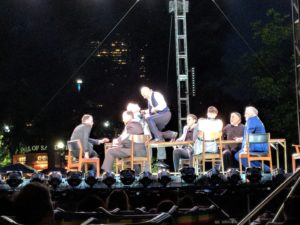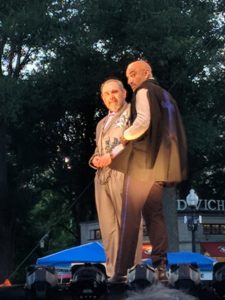My streak continues! I’ve not missed a Commonwealth Shakespeare in the Park performance since 2005. This year I finally met Steven Maler, the artistic director since the beginning. Immediately told him about missing Hamlet, and that I’d toughed out the rain and then stood there, hours late, watching them strike the stage and screaming, “I’M HERE! BRING EVERYBODY BACK!”
Anyway, this year it was Richard III, and I was both excited – because I’ve never seen or really ever studied that one – but also a bit ambivalent, because I had no real stake in this one, you know? I have no special love or hatred of the play, so if I missed it, would I care? But I knew I’d care in the long run, especially about breaking my streak, so I’m happy to report we did not miss.
I tried to explain the general plot of Richard III to my ever patient wife who tolerates my addiction. Coming from someone who’s not read the play my summary is not the greatest, but it went something like this: “Think of it in terms of today’s royal family. Say that Prince Harry has decided he wants to be king. But he’s way too far down the line to ever see the crown, unless he does something about it. So he kills his brother William. Then he decides that he’d rather be married to Kate, but problem, he’s already married. So he kills his own wife, then convinces Kate to marry him, despite the fact that everybody knows he killed her husband. This is too much for Prince Charles’ heart, so he dies. William’s son is in the way too, though, so he’s also got to die. You get the idea. It’s a blood bath.” That’s not a 1-1 match but it gave her some context to work with.
Having never seen a different production I can’t really tell you if I saw a good one. I did not love their Richard. Maybe it was early in the run (it opened on Wednesday, we went on Friday), but I felt like he was having trouble with his lines. His timing was off, and too often you could feel him take an extra pause like he was trying to remember the next word. Once he spoke over another actor’s lines (which I’m pretty sure was not supposed to happen), and I may have imagined it but I thought I heard Clarence feed him a line right at the very beginning.
What I did like, and found quite surprising, was the strength of the female characters. Not surprising in the sense that I didn’t expect strong female characters from Shakespeare, but rather that in all the times we’ve had discussions about Shakespeare best female roles, I never hear this play mentioned.
I loved Queen Margaret, thought she was great. Just this kind of crazy old lady who’s all, “Yup, I know I’m not supposed to be here, but I’m old and I don’t care, I’m going to say whatever I want to say to whoever I want.” I did particularly like when Buckingham recalls her curse just before his death as if to say “Well, I guess the crazy old broad was right. Ok boys, let’s go.”
Special appreciation, though, for Queen Elizabeth. I lost track of how many of her family members were killed during the course of the play. But when Richard stands in front of her and says he wants her daughter, the Queen took the insanity of the situation to a whole other level. The best way I can describe it is if you found yourself in one of those Friday the Thirteenth serial killer movies where almost everyone you know and love has been brutally murdered, only now the guy that’s been doing it isn’t a silent unstoppable monster, he’s here trying to have a conversation with you. And he wants one of your remaining daughters.
This was probably my favorite scene, because on the one side you’ve got Richard who is just so calm in what he’s asking, completely in control of the situation. He doesn’t just want to take the daughter, he wants her mother to thank him for the favor that he’s doing for them. She on the other hand is on the edge of insane at the whole situation.
I think that if I watch more productions (and I plan to), I’ll better understand all the players and how they move about the game. I was trying to stay ahead, including having the script loaded up in my app and following along at some parts. It just wasn’t what I expected. Scenes I thought might have played more humorous did not get laughs. The few laughs that it did get seemed more slapstick, with Buckingham cavorting about the stage and yelling “Boo!” to the children, or Richard doubling over slapping his knee laughing at just how evil he is.
This year they did a thrust(?) stage? Am I using that term right? Basically it came straight out into the audience so most of us were wrapped around the edges. We spoke with one photographer right at the edge of the stage, he was getting some great shots.




 Whenever I see a reference to a Shakespeare inspired video game it immediately catches my attention. Shakespeare’s works are one of the great places to start for public domain stories, after all.
Whenever I see a reference to a Shakespeare inspired video game it immediately catches my attention. Shakespeare’s works are one of the great places to start for public domain stories, after all. We quickly learn that something bad has happened, though what we do not yet know. Jack is bruised, Stephen is trying to get him back into the neck brace, so those are some obvious clues. More telling, however, is that Jack – our director – seems to have no real idea where or when he is. He doesn’t know what play they’re rehearsing (hence his anger at seeing Romeo and Juliet scripts) or why no one else has shown up for rehearsal.
We quickly learn that something bad has happened, though what we do not yet know. Jack is bruised, Stephen is trying to get him back into the neck brace, so those are some obvious clues. More telling, however, is that Jack – our director – seems to have no real idea where or when he is. He doesn’t know what play they’re rehearsing (hence his anger at seeing Romeo and Juliet scripts) or why no one else has shown up for rehearsal.